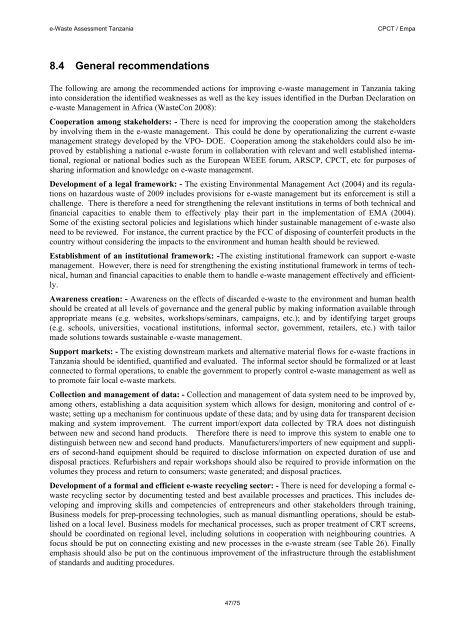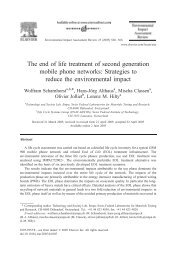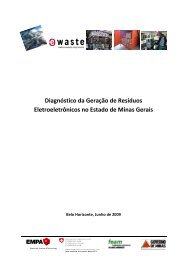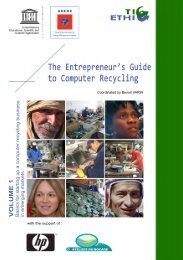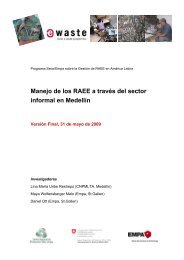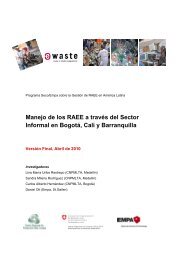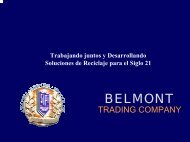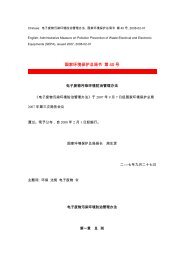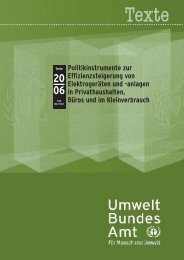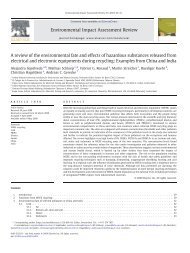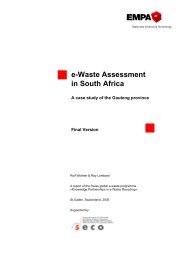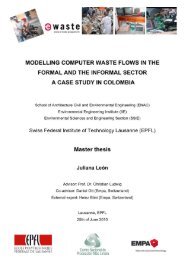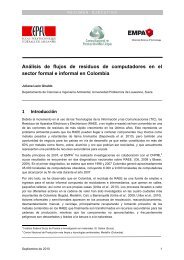e-Waste Assessment Tanzania - e-Waste. This guide
e-Waste Assessment Tanzania - e-Waste. This guide
e-Waste Assessment Tanzania - e-Waste. This guide
- No tags were found...
You also want an ePaper? Increase the reach of your titles
YUMPU automatically turns print PDFs into web optimized ePapers that Google loves.
e-<strong>Waste</strong> <strong>Assessment</strong> <strong>Tanzania</strong>CPCT / Empa8.4 General recommendationsThe following are among the recommended actions for improving e-waste management in <strong>Tanzania</strong> takinginto consideration the identified weaknesses as well as the key issues identified in the Durban Declaration one-waste Management in Africa (<strong>Waste</strong>Con 2008):Cooperation among stakeholders: - There is need for improving the cooperation among the stakeholdersby involving them in the e-waste management. <strong>This</strong> could be done by operationalizing the current e-wastemanagement strategy developed by the VPO- DOE. Cooperation among the stakeholders could also be improvedby establishing a national e-waste forum in collaboration with relevant and well established international,regional or national bodies such as the European WEEE forum, ARSCP, CPCT, etc for purposes ofsharing information and knowledge on e-waste management.Development of a legal framework: - The existing Environmental Management Act (2004) and its regulationson hazardous waste of 2009 includes provisions for e-waste management but its enforcement is still achallenge. There is therefore a need for strengthening the relevant institutions in terms of both technical andfinancial capacities to enable them to effectively play their part in the implementation of EMA (2004).Some of the existing sectoral policies and legislations which hinder sustainable management of e-waste alsoneed to be reviewed. For instance, the current practice by the FCC of disposing of counterfeit products in thecountry without considering the impacts to the environment and human health should be reviewed.Establishment of an institutional framework: -The existing institutional framework can support e-wastemanagement. However, there is need for strengthening the existing institutional framework in terms of technical,human and financial capacities to enable them to handle e-waste management effectively and efficiently.Awareness creation: - Awareness on the effects of discarded e-waste to the environment and human healthshould be created at all levels of governance and the general public by making information available throughappropriate means (e.g. websites, workshops/seminars, campaigns, etc.); and by identifying target groups(e.g. schools, universities, vocational institutions, informal sector, government, retailers, etc.) with tailormade solutions towards sustainable e-waste management.Support markets: - The existing downstream markets and alternative material flows for e-waste fractions in<strong>Tanzania</strong> should be identified, quantified and evaluated. The informal sector should be formalized or at leastconnected to formal operations, to enable the government to properly control e-waste management as well asto promote fair local e-waste markets.Collection and management of data: - Collection and management of data system need to be improved by,among others, establishing a data acquisition system which allows for design, monitoring and control of e-waste; setting up a mechanism for continuous update of these data; and by using data for transparent decisionmaking and system improvement. The current import/export data collected by TRA does not distinguishbetween new and second hand products. Therefore there is need to improve this system to enable one todistinguish between new and second hand products. Manufacturers/importers of new equipment and suppliersof second-hand equipment should be required to disclose information on expected duration of use anddisposal practices. Refurbishers and repair workshops should also be required to provide information on thevolumes they process and return to consumers; waste generated; and disposal practices.Development of a formal and efficient e-waste recycling sector: - There is need for developing a formal e-waste recycling sector by documenting tested and best available processes and practices. <strong>This</strong> includes developingand improving skills and competencies of entrepreneurs and other stakeholders through training,Business models for prep-processing technologies, such as manual dismantling operations, should be establishedon a local level. Business models for mechanical processes, such as proper treatment of CRT screens,should be coordinated on regional level, including solutions in cooperation with neighbouring countries. Afocus should be put on connecting existing and new processes in the e-waste stream (see Table 26). Finallyemphasis should also be put on the continuous improvement of the infrastructure through the establishmentof standards and auditing procedures.47/75


